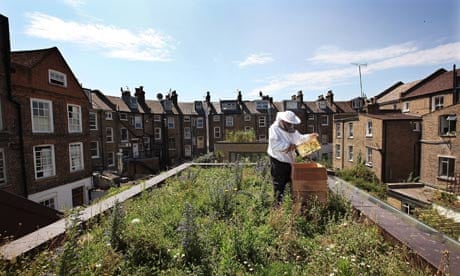Honey has been used by humans for centuries, for sweetening foods to making alcoholic beverages and curing ailments. Pharaohs were buried with it, Greeks and Romans revered it for its culinary and medicinal properties. And today it as still as useful in the medicine cabinet, as the kitchen, to treat colds, hayfever and potentially hospital superbugs.
But has honey ever been used to bring people together and raise awareness about the plight of the bees whose industriousness transforms nectar from flowers into the "food of the gods"?
That is the aim of the Honey Club, which launched on Thursday in London's King's Cross.
A collaboration between international brand consultants, Wolff Ollins, and charity, Global Generation, the club will draw its members from local businesses. In return for a membership fee, companies will be able to send employees to bee-themed events as well as receive a few jars of honey from the rooftop hives on Wolff Ollins' office. Surplus honey – and the two hives next to its roof top vegetable garden could produce 80lbs in the summer – will be sold locally and the money reinvested in the social enterprise.
"We have created a business model with the young people where honey is not just a commodity but a way to bring communities together and to help bees thrive," says Amy Lee, a Wolff Ollins strategist and one of the drivers behind the initiative.
Events will include cooking with honey, bee-friendly urban gardening and documentary screenings on the demise of the honeybee.
So what's been the response from companies? Of the 15 local business visited, all have been really enthusiastic, says Lee, but only two have joined so far. They are media communications specialist, OMD, and the Guardian. OMD says joining the club is about taking a hands-on, more grassroots attitude to social responsibility, being aligned with an established charity, directly involved with local young people and promoting urban sustainability. Such was the enthusiasm it had to hold a competition to see who would be the chosen Honey Club ambassadors.
The Guardian's sustainability manager, Hannah Judge-Brown, says:
"Bees have a lot to teach us and the life of the healthy hive is rich in metaphor for the life of a healthy, sustainable office or any community of people working together. There needs to be good morale for it to work, everyone has their purpose and works together to achieve the goal of the whole, being efficient in using resources and energy, and sharing the surplus."
Lee is confident more companies will sign up: "We want to create the biggest bee-friendly network in the world," she says. And with a Wolff Ollins office in New York, where hives now dot the skyline, the Honey Club could go global.
If it does, the most important lessons corporates could learn from the beehive are that the workforce shares the toils of their labour – in the bees' case the honey they produce to feed themselves over the winter. Those that don't contribute – the workshy male drones – are kicked out of the hive at the end of summer. And the queen bee, despite her regal title, far from being a ruler of the bee colony is a slave to her workers, fed by them when they want her to lay thousands of eggs, starved when they don't – all for the good of the whole colony.
Jane Riddiford founder and executive director of Global Generation says: "Learning about the workings of a hive seems like the perfect metaphor for the kind of collaborative values we aim to encourage."
There are other initiatives bringing bees and business closer. The City of London festival has provided beehives and training to eight city institutions including a large insurance company on the Lloyds building and an investment bank opposite St Paul's, the Golden Company in east London, which teaches business skills to innercity young people by marketing and selling bee-related products, has hives hosted on the roof of Nomura bank, and in Copenhagen, Bybi, is teaching the city's homeless people to become beekeepers for hives on company roofs.
But what sets the Honey Club apart is its desire to educate members how best to help honeybees flourish and what honeybees can teach us. If similar clubs spring up in cities worldwide, where beekeeping is becoming increasingly popular, perhaps we would see profits being more evenly distributed and a fairer and more just society.

Comments (…)
Sign in or create your Guardian account to join the discussion